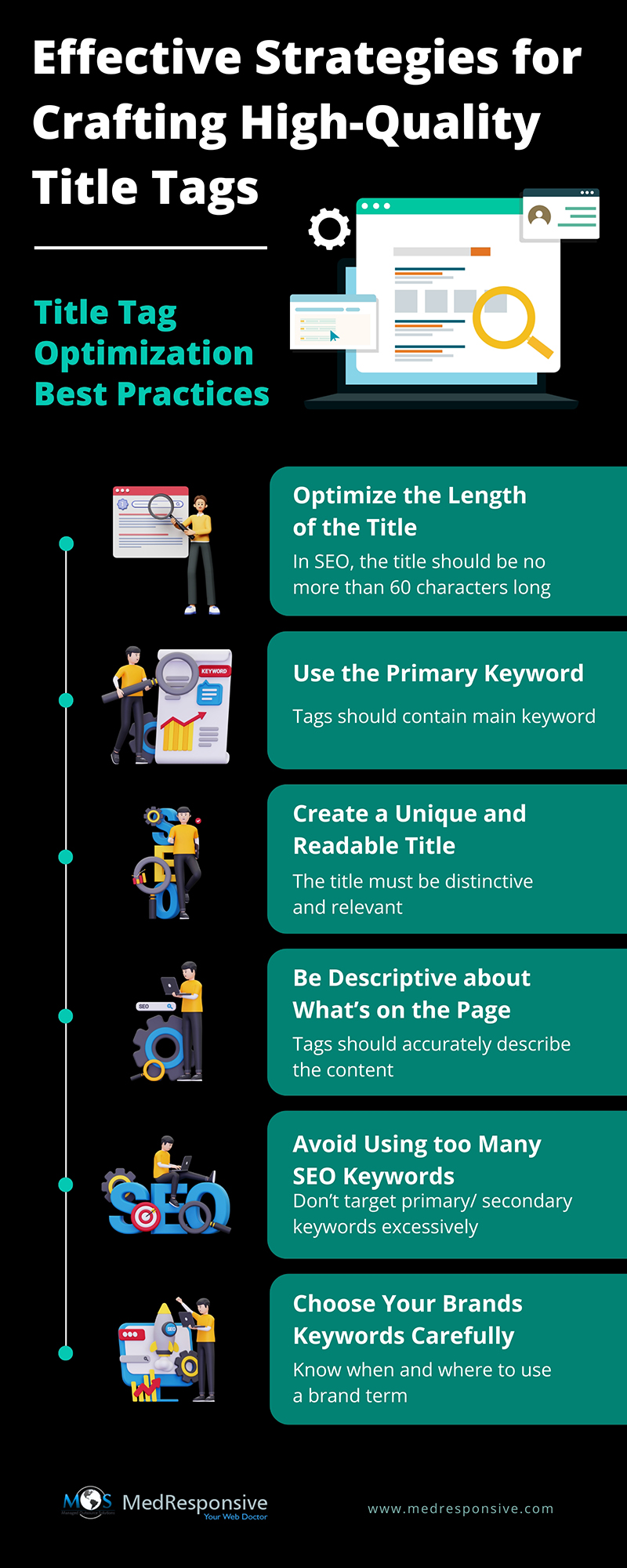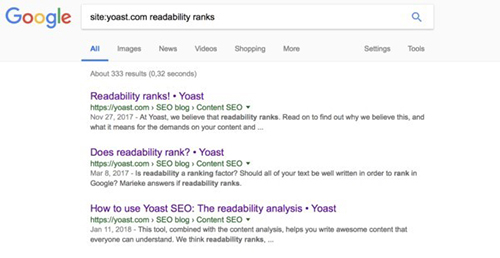A web page’s title, commonly referred to as the HTML title tag, serves as a brief summary of the page’s content for both readers and search engines. Typically, title tags are limited to around 60 characters in length, making them the initial point of interaction for users on search engine results pages. Consequently, these tags hold significant importance in the realm of search engine optimization, as they play a pivotal role in influencing users’ decisions to either click on your website or navigate away. Using organic SEO services for crafting effective title tags can significantly boost your website’s traffic and engagement levels, ultimately leading to improved search engine rankings.
Importance of Title Tags for SEO
The title tag of a webpage provides readers and search engines with a quick overview of the page’s content. Around 60 characters long, title tags are the first thing that users of search engines view on the search results page. This makes title tags a key element in search engine optimization. The decision to click on or leave your website often depends on the effectiveness of your title tags. Well-crafted title tags are clear, compelling, and relevant to attract users and improve search engine visibility.
Google wants to provide users with relevant results for their searches. The search engine needs to be able to distinguish between the topics of various web pages to accomplish this. Google looks at the words used on the page to get this information, but it also gives some areas of the page more weight than others when determining the page’s content. Since it’s a brief and straightforward way for website designers to indicate what will be on the page that follows, search engine algorithms prioritize the title tag when determining what a page is about. Therefore, the use of high-quality title tags is one of the most significant on-page ranking variables.
Beyond their impact on ranking, these tags are crucial for encouraging users to click on the link after it appears in the search results. The title is the first and most noticeable component of the listing they see, it is large and blue, and users assume it will contain the key details they require about the page that is behind that link. Title tags play a crucial role in boosting click-through rates (CTR) once your website appears in search engine results.
Title Tag Vs Page Heading
The title tag is often confused with the page heading. The page heading is the visible headline that appears when visitors land on your website, while title tags are the clickable text that appears in search engine results pages (SERPs). However, more than 90% of website publishers and owners continue to use the same title tag and page heading due to the default settings on the majority of website and content management software. Because this doesn’t affect search engine rankings (SEO), website owners often leave them identical.
There is no strict requirement for the title tag and page header to match. As long as both are original, there’s no harm in having them different. However, you can always revisit and optimize the page or title tag later, even if you initially publish with the same page header and title tag. Optimizing title tags is crucial for SEO.
Optimizing Title Tags
- Length of title: In SEO, a title should be no more than 60 characters long. Anything more than that reads to the visitor as “…..,” which can be unsettling and cause them to move on to the next title in the SERP. The goal of title tag optimization is to make sure the title is both eye-catching and fits the character restriction. This is due to the fact that the majority of searches read the title tag and determine its relevance in a matter of seconds at the most. If the title tag doesn’t grab their attention, people often skip the body copy.

- Primary Keyword: Primary keywords are those that are most closely related to the subject of your post or website. The primary keyword serves as the focal point of a webpage and provides visitors with information about what you have to offer. When used properly, primary keywords can boost your results on SERPs because they receive a lot of searches. Your website’s title tag and even the meta title tag should contain your main keyword. This provides consumers and search engines with a clear understanding of what your page is about.

- Unique, Readable Title: In addition to keeping the title length consistent for SEO, title tags need to stand out on SERPs. Search engines will penalize anything that is copied or irrelevant to your webpage’s main content. The secret to grabbing the searcher’s attention is a distinctive title. Moreover, your title tag should be easily readable and comprehensible. If it contains a lot of complicated or difficult-to-understand words, users may decide to skip it altogether.
- Be Descriptive in your Title Page: Users often decide to click based on the description in your title tag. If they land on a page that doesn’t match the title, they’ll likely hit the back button and move on. Ensure your title tag accurately reflects the content, reducing bounce rates and increasing time spent on the site—signals to Google that your page is relevant. This not only improves SEO but also enhances the visitor experience, encouraging them to return. A clear title tag is key to achieving both.
- Avoid Using Too Many SEO Keywords: Excessive use of primary and secondary keywords can lead search engine bots to flag your webpage as spam. This strategy is designed to prevent manipulation of title tags, meta descriptions, URLs, backlinks, or other visible content to artificially boost rankings in search engine results pages (SERPs). Keyword stuffing often leads to low-quality, spammy content and gives unfair advantages. Both search engines and users can recognize this tactic, which results in a poor user experience and can hurt your website’s visibility.
- Choose Your Brand’s Keywords Carefully: A brand keyword is a term that contains the exact name of your website or domain. These relate to your goods, services, or offerings and include your company’s name and any variations on it. You need to understand when and where to use a brand term. If the brand in question is well-known and well-liked by the general public, brand keywords are great attention getters. Begin title tags or Meta tags with the brand keyword. However, it is recommended to incorporate brand-specific keywords in the second half of your title or meta title tag if you are a new or mid-level recognized company.
- Use Long-Tail Keywords: If you are writing about a niche subject, such as “best fitness suggestions for women,” your search traffic may be relatively modest. Include a long-tail term in the title tag to increase organic site traffic as a quick boost. You may find the long-tail versions of your main keyword on many different websites.
Mistakes to Avoid While Writing Title Tag
- Writing Long Title Tags: While you can exceed the title tag character limit, doing so can break a searcher’s attention and leave it trailing off. As most users want quick answers and solutions, they might move on to the next search result instead of clicking on a half-visible title tag.
- Keyword Stuffing: As mentioned above, keyword stuffing is a manipulative practice intended to increase page rankings on SERPs. However, with better algorithms in place, most search engines can spot the repetitive pattern of keyword stuffing and lower your web page ranking, making this practice counterproductive to extending your reach.
- Keyword Cannibalization: Using the same phrases repeatedly on different pages or areas of your website to improve your ranking on the search engine results page is known as keyword cannibalization. However, this causes the rank of other pages to drop as search engines determine which of your pages is most pertinent to the phrase. Due to the fact that visitors and search engines may encounter several sites with the same keywords, they will have to decide which is most relevant to their query, which lowers the quality of material presented and forces you to compete with your own pages rather than those of your competitors.
Title Tags to Capture Readers’ Attention
Good title tags have the following qualities:
- Concise and Clear: Ideally between 50-60 characters, clearly describing the page content.
- Relevant Keywords: Include targeted keywords that reflect the page’s topic for better SEO.
- Engaging and Compelling: Write a title that attracts clicks by being descriptive and appealing to users.
- Accurate and Descriptive: Ensure the title accurately reflects the content of the page to meet user expectations.
- Unique for Each Page: Avoid duplicate title tags; each page should have its own distinct title.
- Branding: Include your brand name at the end, especially for homepages or key pages, for recognition.
- Avoid Keyword Stuffing: Use keywords naturally without overloading to avoid being flagged as spam.
- Match User Intent: Align the title with what users are likely searching for to ensure higher click-through rates.
Since title tags are brief, they appear to be a deceptively simple element of SEO. However, they specify a webpage’s title and are regarded as one of the most crucial elements for on-page SEO. Don’t assume that just because they don’t require much writing, it is easy to construct a simple title tag. Spend some time considering the terms that will best convey to Google what the website is about and what is useful on the page for potential users. Partnering with an experienced SEO outsourcing company can optimize your title tags, attract targeted traffic, and boost your rankings for maximum visibility.







